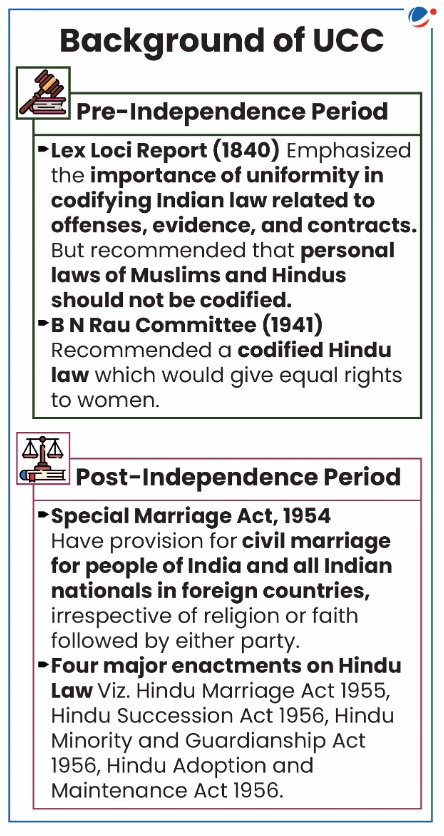Why in the news?
The Uttarakhand State Legislative Assembly passed the Uniform Civil Code, Uttarakhand, 2024 Bill.
More about the news
- With this, Uttarakhand became the first State in the country to pass a law on Uniform Civil Code.
- Also, Assam and Gujarat are the other states working on the implementation of UCC.
- Goa is the only place in India where a form of common civil code is in practice, the Portuguese Civil Code of 1867.
- Key highlights of Uttarakhand UCC
- Applicability: Applies to all residents of Uttarakhand except the tribal community those protected under Part XXI of the Constitution.
- Marriage and Live-in Relationships: Mandates registration of all live-in relationships within one month and marriages within 60 days, applicable to all residents.
- Excludes the LGBTQIA+ community.
- Grants legal recognition to children from voidable marriages and live-in relationships.
- Criminalization of Some Marriage Practices: Bans practices like nikah-halala and triple talaq.
- Prohibition of Bigamy or Polygamy:
- Inheritance: Ensures equal property rights for sons and daughters, departing from the coparcenary system and providing equal rights in intestate succession.
About UCC
- A UCC provides for the formulation of one law for the entire country, which would apply to all religious communities in their personal matters such as marriage, divorce, inheritance, adoption, and succession.
- Currently, Indian personal law is complex, with each religion adhering to its specific laws.
- Personal Laws in India:
- Hindu Succession Act 1956 governs Hindus, Sikhs, Jains and Buddhists
- Muslim Personal Law governs Muslims
- Indian Succession Act 1925 applies to Christians, Parsis, and Jews
- The Special Marriage Act provides for the solemnization of interfaith marriage as well as registration by a Marriage Officer.

Important Judgements and committees recommending UCC
|
Arguments for UCC
- Constitutional Mandate (Article 44): UCC is enshrined in the Constitution's Directive Principles, aiming to create a uniform legal framework for civil matters.
- Promotes Secularism: UCC ensures that civil laws are not influenced by religious beliefs, thus upholding the principle of secularism.
- Fosters National Unity: By transcending religious and community divisions, UCC promotes common citizenship and strengthens national unity.
- Ensures Gender Justice: UCC eliminates discriminatory practices in personal laws, promoting gender equality and women's rights.
- Simplifies Legal Procedures: associated with marriage, divorce, and inheritance.
- Codify Personal Laws: Codifying laws can establish universal principles for fairness and streamline legal processes, promoting access to justice and resolving disputes effectively.
Arguments against UCC
- Threatens Diversity and Religious Freedom: Imposing a uniform code may undermine cultural and religious identities and infringe upon the right to religious freedom guaranteed under Article 25.
- Lacks Consensus among Communities: Implementation without consensus from diverse communities may lead to social unrest and resistance.
- Raises Concerns about Federal Structure: Some argue that UCC could encroach upon states' legislative powers, disrupting the principles of cooperative federalism under Schedule 7 entry 5.
Way forward
- Seek Consensus: The government should engage in constructive dialogues with all stakeholders, including religious leaders and community representatives, to garner support and address concerns.
- Ensure Political Will: Implement UCC in a non-partisan and inclusive manner, avoiding its use as a tool for political gains.
- Raise Awareness: Conduct awareness campaigns to educate the public about the rationale behind UCC and its benefits, involving government, civil society, and media.
- Adopt a gradual process: Review existing personal laws to align UCC with principles of justice, equality, and non-discrimination, ensuring fairness for all.







